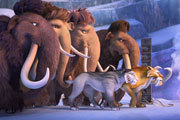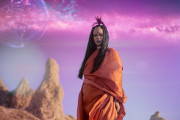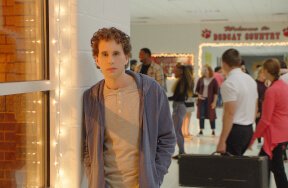By: Lynn Barker
(Warning: This interview contains several “spoilers” relating to the film story and character relationships. If you don’t want to know, read it after seeing the movie)
Chris Pine (Captain Kirk) , Zachary Quinto (Mr. Spock), Zoe Saldana (Uhura), Karl Urban (Dr. McCoy), John Cho (Mr. Sulu) and Simon Pegg, who plays Scotty and also co-wrote Star Trek Beyond, gathered to talk to press and fans about the film, their feelings about late castmates Leonard Nimoy and Anton Yelchin and what is unique and fun about the new movie.
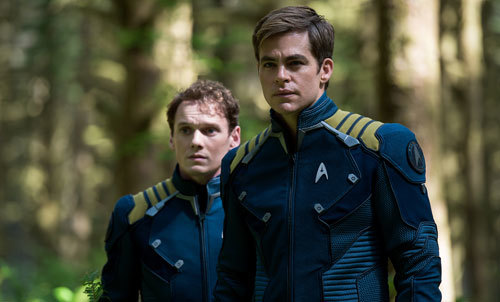 Anton Yelchin (Chekov) with Chris Pine (Kirk)
Anton Yelchin (Chekov) with Chris Pine (Kirk)
Q: Simon, can you talk about honoring the 50th anniversary of Star Trek and also appealing to moviegoers who’ve never seen a Trek movie before?
- Simon: That was very important to us to create a hybrid of an episode of the original series with a spectacular, cinematic event film. With the TV series, you get time to spend with the characters. With a film, you kind of have to hit it. It has to be self-contained and memorable. That was the thing, to try and make sure that everybody that’s been here for fifty years gets what they deserve, in terms of a good “Star Trek” film and (people who’ve never seen one) they’re welcomed too. This is an inclusive universe in every way, not just fictionally but factually.
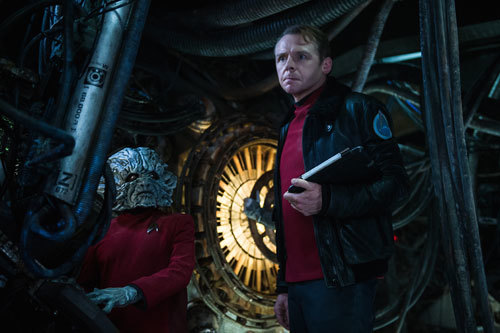 Simon Pegg as Scotty
Simon Pegg as Scotty
Q: We’ve seen the Kirk/Spock dynamic before but now, going back to the old series, we have Spock and McCoy together a lot. For Karl and Zach, how was exploring their relationship?
- Karl: I feel like this is probably the most fun that I’ve had making a “Star Trek” film. I had an amazing time working with Zach. I have a huge amount of respect for him and his approach. It was great to have those two characters that are so diametrically opposed to each other be forced into a situation where they have to depend on each other to survive. It was obviously a great opportunity to explore a lot of comedy but then to also really deepen the relationship between the two, and I think that by the end of it they were able to go back to their respective corners with a bit of inside knowledge. For long-term fans, it’s a rewarding interaction.
- Zach: Karl and I had a great time. In a movie franchise where we’re used to spending so much time together, all of us on the bridge of the Enterprise, and in many of our adventures, it was actually really nice to have so many days where it was only Karl and me together. I think we got to know each other and appreciate each other already more than we already did. I really echo the idea that these two characters come at things from entirely different perspectives and points-of-view, and I think there’s nothing more fun for fans of the original show to see that dynamic unmitigated by Kirk, who usually manages to get between them. Bones really saves Spock’s life in this film. I think there’s a deep appreciation for that, obviously. And they end in a much better place as a duo than I would say they begin it.
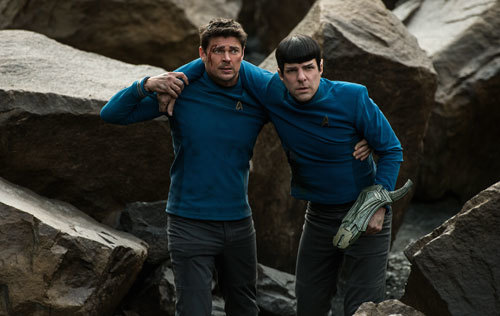 Karl as McCoy with injured Zach as Spock
Karl as McCoy with injured Zach as Spock
Q: There is also a great scene at the beginning of the film between McCoy and Kirk. Chris, can you talk about exploring that?
- Chris: Yeah, I always have the most fun on these films are either when we’re laughing or talking, and then usually shit blows up and we have to do shit-blowing-up-acting. I think I spend the majority of the film saying: “Let’s go! Can we do it? I don’t know.” And just breathing heavily. So that scene in particular was one of my favorites. (In this film), Kirk is moving out from underneath his father’s shadow. To do it with Karl was great fun.
 Chris as Kirk on the bridge
Chris as Kirk on the bridge
Q: Zoe, can you talk a little bit about the evolution of Uhura and also her feelings for Spock in this movie?
- Zoe: She’s tired. I think she’s homesick and sad, and (it’s about) how being overworked and away from home, and all the things that keep you grounded, can put a strain not just on the intimate relationships that you may have, but also the professional ones. And I thought I would never see the day where I would walk into the Enterprise and we’re not that excited to see each other but we literally end up in the opposite direction. We’re dying to be close to each other. So I thought, ‘Okay, that’s brilliant.’ I guess that relationship with Spock and Uhura felt so normal and human to me that it’s sort of the consequences that may occur when you decide to love your co-worker in a lovey-dovey way.
- It’s just sometimes the professionalism can get in the way of the spirituality and I feel like that’s what happened between both of them. I do have a feeling that it was probably her decision to sort of go, “Listen, you have a lot of stuff that’s about to start brewing from your end, and I have to figure some stuff out, so it’s probably just best…”
- Zach: (joking) That was your decision?
- Zoe: Be a gentleman.
- Zach: Think what you need to.
 Zoe Saldana as Uhura
Zoe Saldana as Uhura
Q: So is their relationship doomed or do you have hope?
- Zach: I think it ends on a really hopeful note, don’t you? Let’s go with hope.
- Zoe: But I mean, if he were to walk in with some other Vulcan girl, shit will go down! (laughter).
 John Cho with Zoe in the dusty crater
John Cho with Zoe in the dusty crater
Q: Zoe, it’s been 50 years now since “Star Trek” began and it seems Uhura especially has gone through changes that mirror women’s changes in science fiction, in our culture and society. Can you talk a little bit about how you think she’s evolved 1966 to 2016?
- Zoe: Women are becoming very-very independent. Not just at the work force but also in their personal lives. These days, there’s no longer this animosity or this resentment to sort of prove who you are. You just want to be left alone to sort of find out who you are because you’re interested and you’re curious. So, I like this autonomy that’s happening with women right now. I think it’s a battle fought with a spoken word, and nothing that feels tense or violent behavior.
- John: People have asked which timeline would you choose to be in: the original series, or ours, if you had the choice. And I did say ours if we were forced to choose. Roddenberry did set up a world that incredibly progressive, but it was tempered by the social mores of the era, and I feel like we can go further in 2016 than he was able to do at the time. And to your point, I feel like, our version is able to give more to the women and people of color in the cast, than (creator Gene) Roddenberry was originally able to.
- Simon: And not because he didn’t want to either. He absolutely wanted to.
 A frightened Uhura
A frightened Uhura
Q: John, when did the idea come up on how to really give more background into Sulu’s character (he’s revealed to be gay)?
- John: I believe Simon pitched it. I had concerns about how it would be received, by George (Takei), and I had some other concerns, but it was really the handling of it that was most important to me, And, having seen the film, I think it’s nonchalant and that’s the best thing about it; the fact that it’s normalized, and it’s kind of news now but if you re-watch the movie in 10 years, you won’t think anything of it. It’ll just go right by you, and that’s the best thing about it. There’s no music cue. There’s no close up.
- Zoe: It wasn’t just that we revealed that he’s gay. We revealed that he’s a father. So, none of our characters have families that we’ve ever talked about. So I actually feel quite puzzled that in 2016 we’re having a bit of a fit over who he fathered a baby with. I’m happy he’s a dad.
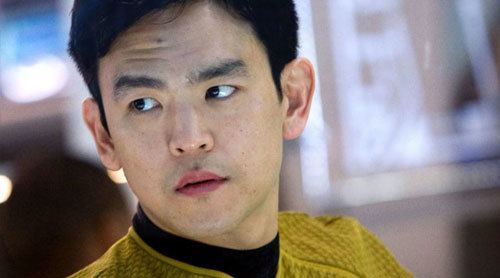 John Cho as Sulu on the bridge
John Cho as Sulu on the bridge
Q: The film has such a lovely tribute to the late Leonard Nimoy, who originated the Spock character. Was he once supposed to be in the film and, after he passed did you consider how to honor him?
- Zach: Yeah, he died February 27 (before the movie was shooting). I think if Leonard was well enough to be a part of this film, I’m sure he would’ve been. He knew that-that wouldn’t be possible at a certain point. And then I think it became important to all of us to figure a way to honor his legacy, and I thought Simon and Doug did a beautiful job of incorporating it into the narrative of the film. We all carried him with us through this production, for sure. And it was definitely a different kind of feeling to make this movie without him, for me in particular. But I think he was very much a part of it in spirit, and certainly in the film now, and will be a part of anything we do moving forward for sure.
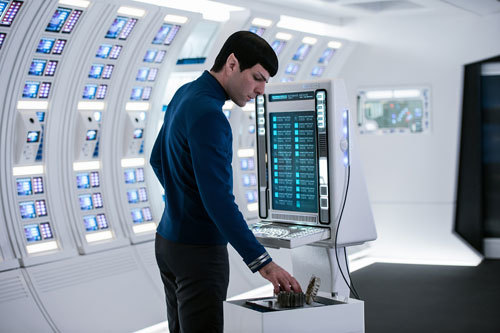 Zach as Spock analyzing data
Zach as Spock analyzing data
Q: Also, this film is a bit bittersweet with the loss of Anton (Yelchin, plays Pavel Chekov). What was it like working with him?
- Karl: First off all, it's terrible to lose a family member. You know, we're at a point where we should be celebrating this film, but also this beautiful man...this talented man. And for all of us it is almost incomprehensible where we have to talk about him in the past. The pain of his loss is still very raw. We spent time with Anton's family and we know that they will be very proud of his contribution to film and this film will forever be probably the most special experience for all of us. It represents a golden period where our family was fully together for the last time and it really was as Simon said, "The best summer of our adult lives." We love him so much and we miss him terribly.
- Chris: He was just a good guy. He was very sweet. He was very beautifully and authentically Anton. There was not much of a censor on the boy. And I remember one of the first times I met him, nine years ago or whatever, he was 17, and I invited him back to my trailer to play guitar because I knew he played guitar really, really well. And he said, "I can't, man. I have to go back my trailer." And I was like, "Okay. Why?" And he was translating an esoteric Russian novel into English because that's what he wanted to do.
- He was just totally fearless. You try to grasp onto something positive out of losing such a good guy and I think it's just be fearless creatively. He was always working on stuff. He had music projects, photography projects, and he was going to direct his first film this summer. He was just spectacularly interested in life in a really great way.
 Anton Yelchin (Chekov) with Kirk in action
Anton Yelchin (Chekov) with Kirk in action
Q: The film takes everyone off the ship and to other planets fighting evil aliens. What was that like for you guys?
- Zoe: Well, I like being on the ship. You don't understand, we were in a quarry and there was dust everywhere and helicopters flying really low. I don't know. I like being on the Enterprise. It's cleaner.
- Karl: The spirit of exploration right here (laughter).
- John: On the upside it was cool to be paired off with Zoe. Even though you were having a miserable time I enjoyed spending time with you.
- Zoe: You heard how much I was complaining, but I was happy I was complaining with you.
- John: Typically as characters on the bridge everyone is relating to Kirk. So, there's less talking to one another, so bringing out that opportunity brought out some other colors and vibes so that was good.
 Spock and McCoy with alien Jaylah
Spock and McCoy with alien Jaylah
Q: Let’s talk costumes. Were they tight? Did you have to skip lunch sometimes?
- Simon: I think the pants were looser.
- Chris: The pants were fantastic this time. So much movement. A lot of space in the ships which I appreciated. This was the retro super future version of Star Trek. It's looking way ahead into what Star Trek can become and also having very specific nods to the past and throughout our three films so far there’s been a lot of discussions about colors of yellow for Kirk's shirt and the cut of the shirt and this one is a really specific nod to the original series. It's not the kind of bright, fantastic yellow of the first and the second. It's this lovely Kirkian mustard green. And I ate a lot of lunch.
- Karl: Anja (Milkovic Hays) our costume designer did an extraordinary job. One of the first things I did when I got to Vancouver was I went to Sanja to talk about that (there were no rank insignias on the women’s costumes). And she said, "Oh. Don't you worry. Women will have ranks." So, I think she did a great job. Also a bit of a 60s throwback to the costumes but also making them new. I had massive envy for Chris Pine's survival suit.
- Chris: Yeah. But you got that wonderful shade of blue, Karl. You look lovely with that complexion of yours.
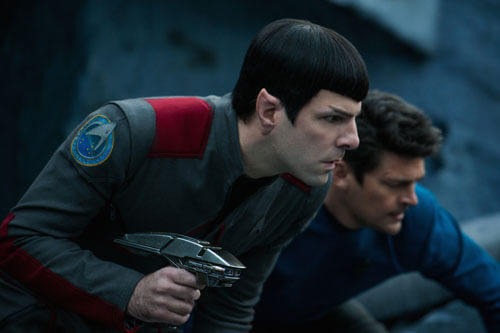 Spock with McCoy gets ready for battle
Spock with McCoy gets ready for battle
Q: What can the message of Star Trek be in 2016 to help propel it forward for perhaps another 50 years?
- Zach: I think the message is the same as it was when it began. We have more room to explore and express it than we did at the time. It's shocking to me how divisive our culture has become. And I feel like Star Trek maintains a position of inclusivity and unity that is as resonant today as it was in the ‘60s. This film in particular explores that idea.
- It's troubling to me on such deep levels that we've gotten to this point of unwillingness to see varied points of view or feelings or opinions of perspectives and I think that while Star Trek remains in a landscape of popular culture entertainment, it's something that is a beacon of inclusivity and progressive thinking. I think it just takes on different forms now than it did 50 years ago.
- Simon: The social commentary of this even since we shot it is stronger than ever. It's about collectivism. In this era of Brexit and talking about building walls in certain places. Now more than ever we should be thinking about the value of collectivism...about cooperation.
- Zoe: Unity.
- Simon: And unity. That can be and is our strength. The more fractured we become the less secure we all feel.
- John: In the Star Trek setup you're going into space and you're seeing so many kinds of species. It does become comically apparent when you look around the planet Earth and we do have so much more in common than we don't, so the little things that seem to divide us here in our present time seem even more exaggeratedly small after seeing an episode of Star Trek.
- Simon: We've all got one head. Do you know what I mean? Let's live together.
 Star Trek Beyond PosterCourtesy of Paramount Pictures
Star Trek Beyond PosterCourtesy of Paramount Pictures
See Star Trek: Beyond in theaters starting this Friday, July 22nd.
Have Your Say
Are you looking forward to the new Trek film? How much do you know about the Trek universe or are you more interested in Star Wars? Leave a comment!




























